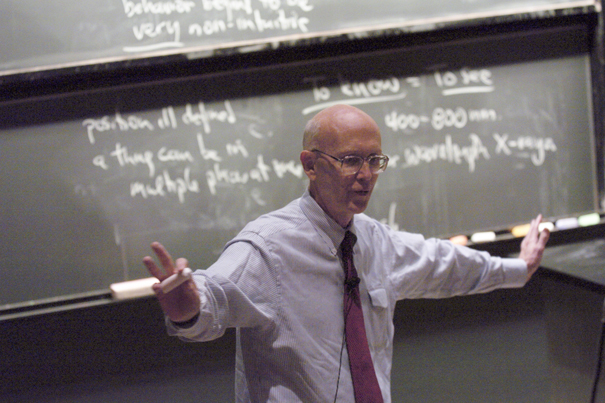Health
-

Yoga can help cut severe, initial opioid-withdrawal period in half, study finds
Researchers say results could dramatically increase chances of recovery
-

6 keys to a long, healthy life (ice cream included)
Also, why reading Ben Franklin beats climbing Mount Everest
-

Six cancers rising faster in younger adults than older ones
Large new global study fuels growing concern over trend of increases in several types

-

What’s next for GLP-1s?
Scientists eye new treatment targets for popular weight-loss drugs, from heart failure to addiction
-

Pricey blockbuster GLP-1s are costing users — and most of the rest of us, too
Health insurers are passing along cost for coverage in form of higher rates across the board, policy researcher says
-

Drinking 2-3 cups of coffee a day tied to lower dementia risk
Caffeinated tea also found to slow cognitive decline in study

-
Search for new tuberculosis drugs outlined
A new drug candidate that attacks the cell walls of tuberculosis bacteria offers a promising alternative in the fight against a disease that has been resurgent in the global age of AIDS, according to findings highlighted by a key researcher Friday (June 12) at the Broad Institute of Harvard and MIT.
-
Researchers learn how mutations extend life span
In the sense that organisms existing today are connected through a chain of life – through their parents, grandparents, and other ancestors – almost a billion years back to the…
-
After a century, link between chromosomal instability and centrosome defects in cancer cells is unraveled
In a new study, Dana-Farber Cancer Institute scientists disprove a century-old theory about why cancer cells often have too many or too few chromosomes, and show that the actual reason…
-
AML patients benefit from stem cell transplants
A stem cell transplant (SCT) from a compatible donor early in the course of disease is the best approach for the majority of young and middle-aged adult patients with acute…
-
Mobile health van returns $36 for every dollar invested
Researchers from Harvard Medical School (HMS) have developed a prototype “return on investment calculator” that can measure the value of prevention services. Using a Boston-based mobile health program called the “Family Van” to test the tool, the team found that for the services provided in 2008, this program, in the long run, will return $36 for every dollar invested.
-
Researchers solve ‘bloodcurdling’ mystery
By applying cutting-edge techniques in single-molecule manipulation, researchers at Harvard University have uncovered a fundamental feedback mechanism that the body uses to regulate the clotting of blood. The finding, which…
-
Shining light on leptin’s role in brain
In investigating the complex neurocircuitry behind weight gain and glucose control, scientists have known that the hormone leptin plays a key role in the process. But within the myriad twists…
-
How growing cells move together
Our cells are more than inert bags of proteins and genes whose complex signaling networks confound the world’s most powerful computers. They also have a physical side whose brawny feats…
-
Video can help patients make end-of-life decisions
Viewing a video showing a patient with advanced dementia interacting with family and caregivers may help elderly patients plan for end-of-life care, according to a study led by Massachusetts General…
-
DFCI cancer research highlights age-related treatment effectiveness, patient cost concerns
New research from the Dana-Farber Cancer Institute highlights age-related responses to colon cancer treatment and patient attitudes toward cost of drugs to manage side effects. Research presented at the American…
-
Chemical leaches from plastic drinking bottles into people
A new study from Harvard School of Public Health (HSPH) researchers found that participants who drank for a week from polycarbonate bottles, the popular, hard-plastic drinking bottles and baby bottles, showed a two-thirds increase in their urine of the chemical bisphenol A (BPA).

-
Acid-suppressive medicines increase pneumonia risk for hospital patients
Ever since a class of drugs called proton pump inhibitors was introduced to the market in the late 1980s, the use of these acid-suppressive medications for heartburn, acid reflux, and other gastrointestinal symptoms has grown tremendously. The widespread use has extended to the inpatient hospital setting, where patients are often routinely given the medications as a way to prevent the development of stress ulcers.
-
Brigham face transplant recipient goes home
James Maki, a 59-year-old who became the nation’s second face transplant recipient in April to repair injuries from a horrific subway accident, left Brigham and Women’s Hospital on Thursday (May 21), thankful for what he called a “new chance to build my life.”
-
Evolution explored from all angles
From humanity’s close relationship to chimpanzees to the missing link between land and sea creatures, the Harvard Museum of Natural History (HMNH) has capped off a year celebrating Darwin and “On the Origin of Species” with a new exhibit that puts evolution front and center.
-
Biology department evolves at FAS
Earlier this month, the Faculty of Arts and Sciences (FAS) made official what scientists worldwide have known for years: Harvard is a hotbed of research and teaching in the field of human evolutionary biology — the study of why we’re the way we are.
-
‘Super-recognizers’ never forget a face
Some people say they never forget a face, a claim now bolstered by psychologists at Harvard University who’ve discovered a group they call “super-recognizers”: those who can easily recognize someone…
-
‘Super-recognizers’ are the ones who really will never forget a face
Some people say they never forget a face, a claim now bolstered by psychologists at Harvard University who’ve discovered a group they call “super-recognizers”: those who can easily recognize someone they met in passing, even many years later.
-
Patients expect computers to play major role in health care
As President Obama calls for streamlining heath care by fully converting to electronic medical records, and as Congress prepares to debate issues of patient privacy, one question has largely gone unasked: What do patients want?
-
New study assesses quality and cost of care at nation’s hospitals
Costly care isn’t necessarily better care at the nation’s hospitals. New research conducted by a team including Harvard Kennedy School Professor Amitabh Chandra represents one of the first nationwide analyses…
-
Genetic testing for breast or ovarian cancer risk may be greatly underutilized
Although a test for gene mutations known to significantly increase the risk of hereditary breast or ovarian cancer has been available for more than a decade, a new study finds…
-
Broad scientists to sequence multiple myeloma samples
The Multiple Myeloma Research Foundation (MMRF) announced today a collaboration with the Broad Institute of Harvard and MIT to systematically uncover the molecular changes underlying multiple myeloma by whole-genome sequencing…
-
Study finds genetic links to age of first menstrual period, menopause
Newly identified gene variants associated with the age at which females experience their first menstrual period and the onset of menopause may help shed light on the prevention of breast and endometrial cancer, osteoporosis, and cardiovascular disease.
-
Researchers identify the brain’s on-off switch for fear
Harvard researchers at McLean Hospital have identified a particular protein in the brain that serves as a trigger for the body’s innate fear response. This discovery suggests a potential target…
-
Glutamine supplements show promise in treating stomach ulcers
Nearly 20 years ago, it was discovered that bacteria known as Helicobacter pylori were responsible for stomach ulcers. Since then, antibiotics have become the primary therapy used to combat the…
-
New Web page addresses travelers’ health safety
Because of the recent outbreak of the H1N1 influenza, commonly called the “swine flu,” Harvard University Health Services (HUHS) and the Provost’s Office have created a new Web site to address concerns regarding the medical safety of international travel
-
Whitesides receives inaugural Dreyfus Prize in the Chemical Sciences
The Camille and Henry Dreyfus Foundation announced that George M. Whitesides, the Woodford L. and Ann A. Flowers University Professor of Chemistry at Harvard University, has won the inaugural Dreyfus Prize in the Chemical Sciences.

-
Common virus could cause high blood pressure
A new study suggests for the first time that cytomegalovirus (CMV), a common viral infection affecting between 60 percent and 99 percent of adults worldwide, is a cause of high…
-
Survey: Many Americans protecting themselves against H1N1
As part of a series about Americans’ response to the H1N1 flu outbreak, the Harvard Opinion Research Program (HORP) at the Harvard School of Public Health (HSPH) has released a…
-
Lack of sleep is easier on older adults than others
In a recent sleep study testing alertness and performance in sleep-deprived adults, researchers at Brigham and Women’s Hospital (BWH) determined that healthy older adults handle sleep deprivation better than younger adults. The findings appeared online on May 3, in an advance online edition of the Journal of the American Geriatrics Society.
-
Lessons from past explored to expedite future research
People, knowledge, communication, and capitalism were front and center last week as authorities on innovation sought to shed light on ways to speed up the development of new medical treatments from discoveries in the lab.

